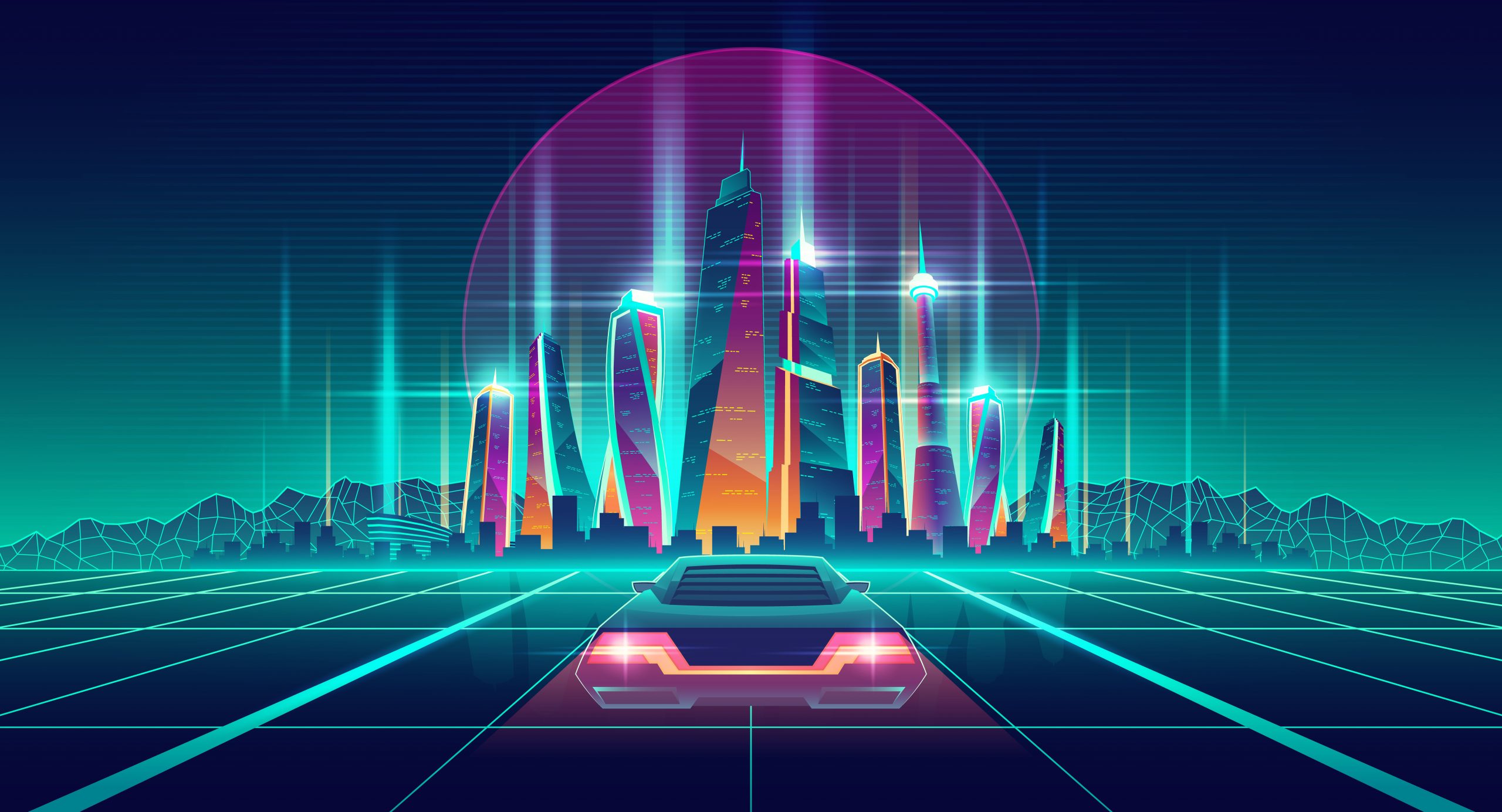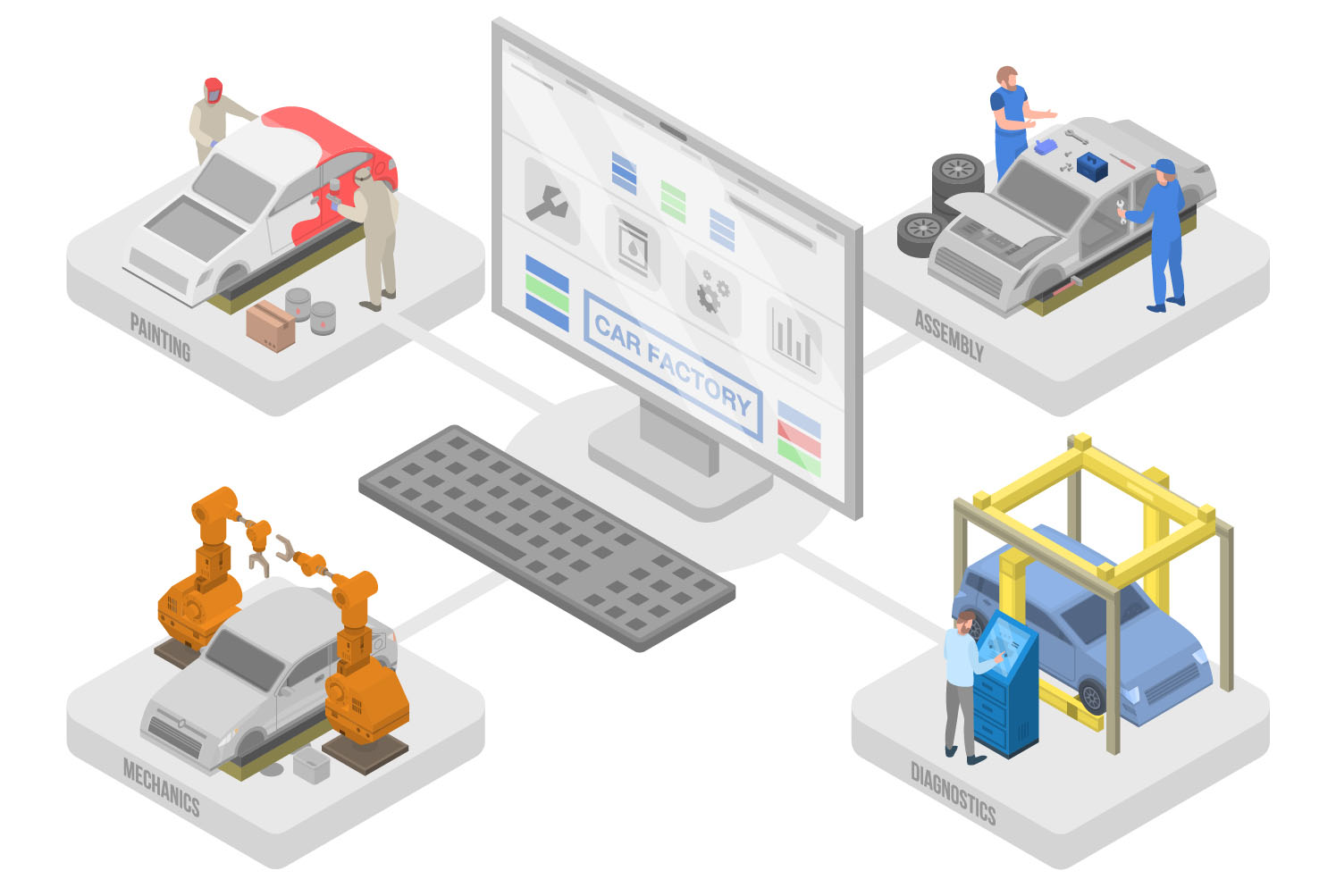Formula Infinity
Engineering is too important to not be a game
Formula Infinity is a multi-institutional interdisciplinary project, unique in its connection to esports and youth culture. The vision is to create a pedagogical racing game where you get to build and race with virtual cars, and in this way learn about technology.

In part 2 we discuss what skills our future engineers will need.
We open this part with a video showcasing some creative games on the market today. This is followed by a panel discussion with Sofia Ore (CAE Director at CEVT), Patrik Lilja (Assistant Professor of pedagogics at the University of Halmstad) and Sara Hermansson (Talent Attraction Manager at Northvolt).
A digital study visit at Simgården
On june 11, a digital seminar was conducted on Project Simgården, a digital test environment for learning to drive heavy machinery used within agriculture and forestry. Jörgen Holmén, Peter Ågren och Bengt Jonsson told us about the project, and we got a digital tour of one of their simulator centers. The seminar is in Swedish and can be seen on youtube.
Visiting the Digital Design Podcast
This week, Hans made an appearance on the Digital Design podcast, presenting and discussing the Formula Infinity initiative. The podcast can seen and heard on youtube. The Formula Infinity discussion starts at 06:21.
Project idea finished!
The final version of the project idea is now finished! March 3, we sent a proposition for a project idea to all the participating universities and the Swedish Car Sports Association. From then, halfway through April, we've had individual conversations with all of the participants, resulting in this project idea. Now, work begins on informing the industry [...]
Online Seminar
January 20, Jean-Francois Chardon, producer of the sim racing game RaceRoom at Sector3 Studios, conducted a seminar about physics engines and the simulator game industry. Jean-Francois told us that racing simulators have several underlying engines, both for handling physics and graphics. It was especially interesting to see what type of data the physics engine of RaceRoom needed. Long lists [...]
Workshop I
Dec 5, 2019, representatives of 11 academies around Sweden met up with the Swedish Car Sports Association at Halmstad University for the first Formula Infinity Workhop. Around 20 people attended and listened to presentations on game engines, engineering, gamified pedagogics and esports. The presentations were held by Petter Sjöstrand, a freelance Esports expert, as well as Eric Stranne, chairman of the Virtual Racing division [...]

Blekinge Institute of Technology Engineering module. Specialized in machine- and vehicle technology. |

Chalmers University of Technology Engineering and esports modules. Specialized in computer science, electrical engineering, mechatronics, game development and cloud integration |

University of Gävle Engineering and pedagogics Specialized in machine and vehicle technology |

Halmstad University Engineering and pedagogics Specialized in machine- and vehicle technology, pedagogics and learning and gender perspective and norm critical design |
|---|---|---|---|

Karlstad University Engineering and pedagogics Specialized in computer science, machine and vehicle engineering, human-computer interaction and pedagogics and learning. |

Royal Institute of Technology Engineering module. |

Luleå University of Technology Engineering module. Specialized in machine and vehicle technology. and material engineering and sustainability. |

Högskolan i Skövde Nytillkommen projektmedlem. |

Högskolan Väst Nytillkommen projektmedlem. |

Linnaeus University Engineering module. Specialized in machine and vehicle technology |
|---|---|

Mälardalen University Engineering and pedagogics Specialized in machine and vehicle engineering, material sciences and sustainability, human-computer interaction, technical design, applied AI and pedagogics and learning. |

Lunds Tekniska Högskola Engineering module. |













Formula Infinity is a racing simulator which focuses as much on building your car as driving and racing. With an advanced physics engines and pedagogical support systems, you learn to build your own car and then get to race it on realistic or fantastical tracks.
The game will make use of play and curiosity and provide an opportunity for the interested to deepen their knowledge through experimenting with realistic technology. In Formula Infinity, knowledge, information and pedagogical help tools will be readily available, in an interactive and simple fashion, whenever the player wants to use them.
Formula Infinity should be developed as an open platform for public benefit. The game needs to be free and accessible to fulfill its purpose, but commercial powers need to be involved to ensure a sustainable development and future for the game.
The difference between a racing simulator and a racing game can be subtle for the uninitiated. A simulator tries to emulate real world racing as accurately as possible, and the simulators of today have virtual models for tire wear, break heating, damper curves, etc. “Regular” racing games aren’t as focused on realistic models, but rather focus on creating fun and exciting gameplay.
These simulators are so realistic today that they also function as practice tools for drivers in real vehicle sports. The tracks are laser scanned and the cars are simulated based data from their real world counterparts in collaboration with car manufacturers and racing teams.
Game engines, including racing simulators, are comprised of several interconnected engines, such as a physics engine, a graphics engine, a sound engine and a networking engine. The physics engine calculates and simulates all the physical aspects of driving, such as downforce, engine power, steering, roadholding, etc. The graphics engine only handles the graphical representation, i.e. what we see on the screen.
For Formula Infinity, we will need to develop a physics engine that also simulates the separate sub-systems for a car both during construction and during driving. To accomplish this, we will use all of the expansive competencies within our universities.
Within the Formula Infinity concept, engineering is as important as driving. The design of realistic as well as imaginative race tracks will give players and teams very interesting engineering challenges. How would you build a car that could handle a race on the moon, on the inside of a volcano or to drive through a breathtaking loop?
The novice might suffice with driving pre-constructed cars and out of curiosity might disassemble them to see how they work. When we’ve sparked interest for modifying something on the car, such as wheel size or engine size, we let a pedagogical and inspiring virtual engineer help the player do this.
During the first Formula Infinity workshop, we identified that the key to engaging young people would be to step outside of the purely theoretical facts and to let them explore through play and "trial and error”.
Formula Infinity is by its nature a so called “sandbox” game. In such a game you give the player a set of tools for creating and interacting without any larger goals or linear progression. In a lot of games in the genre, it is up to the players and community to set individual or mutual goals within the game, such as competing, exploring or just playing around. Many games within this genre have been gaining a lot of fame - games such as Minecraft, Kerbal Space Program, Factorio and ARK: Survival Evolved to name a few.
The swedish game Minecraft quickly became one of the world’s most renowned and played games. Minecraft can be said to be the digital representation of a LEGO world, where you can freely build whatever you like, or play a survival campaign in which you get to build yourself a home, gather resources and food and fight skeletons during the nights.
In Kerbal Space Program, you take the role of a rocket engineer that gets to design, build and then fly your own rocket into space, to the Moon, to Mars, etc. The rocket is built from pre-existing components and is then simulated according to its structure at flight.
In Factorio, you land on a new planet with knowledge about technology, but no technology with you. Your task is to gather resources to build machines that will then gather more resources for you so that you can start building automated processes for gathering even more resources. Simply put, Factorio is an industrial automation simulator.
This is a more unforgiving version of Minecraft. In this game, you are to survive on a tropical island filled with dinosaurs alone or together with other players. You gather resources, make shelter, develop technology and tame dinosaurs to slowly gain control of your island.
It is important to build test environments in the game that will give you direct and clear feedback on how your changes impact your car and its subsystems. When players have become curious about why a system behaves the way it does, we can offer pedagogical tips and facts to help them improve the construction.

The game builds on playfully gaining knowledge about vehicle engineering. The knowledge isn’t forced on the player, but is always available through help and information systems concerning:
- Fysik och teknik
- Material och hållbarhet
- Mekatroniska och digitala system
- Optimering och testning
- Designprocesser för bilkonstruktion
To drive vehicles at the edge of their capabilities means that you very closely encounter the effects of physical laws. Cornering at high speeds creates centripetal acceleration, which needs to be handled by the wheels. The wheels are connected to the wheel suspension, with springs, dampers and axles. As a player, you will gradually start understanding the physics by observing these effects. There is a great opportunity for us to then explain the underlying theories and motivate current technological choices within race car engineering.
Within extreme technological fields, such as racing, material properties are very important to functionality. To build light and strong is always a series of compromises and decisions. Some materials are firm and delicate, others are soft and durable. In every decision, you also have to consider sustainability choices such as energy consumption and environmental impact of production, use and recycling. The material choices therefore rely both on function as well as ecological impact.
A modern race car is loaded with mechatronical and digital systems. The electrical systems need to be as developed and engineered as the mechatronical systems. As a player, you will gradually start to understand these governing systems and learn to create and program steering systems for gearboxes and breaks, among other things.
In this context, artificial intelligence is a very important component. In Formula Infinity, the player can, via sensor data, develop everything from regulation of subsystems in real time to completely autonomous cars that compete against each other.

When a race car is being developed, you need to keep testing it in many ways to achieve optimal performance. These tests need their own facilities and laboratories, where specific properties such as engine effect, or aerodynamic forces can be measured. At other times, you want to be able to test the car on a race track, measuring forces, temperature and velocity.
To build a race car or a subsystem for a race car, you follow certain design processes. You might start from a given construction base, or develop everything from scratch. As a player, you will start understanding and using the development processes within the industry today.
In computer games, progression and pedagogics are important tools for keeping players interested. Formula Infinity needs to be pedagogical and educational through direct interactive feedback, always reacting to the players choices. Packaging specific information into videos and interactive episodes is an important part of player progress.
Here are three ways in which Formula Infinity as an open source platform will create value:
- Teachers and scientists can keep creating new and improved physics models to make Formula Infinity more complete as a platform for education and simulation.
- Formula Infinity as a platform for the industry to build their own initiatives and software, just as with other open systems.
- Game development companies, communities and others interested can use Formula Infinity to build their own games and software.
The term “Open Source” initially referred to Open Source Software. Software code open for anyone to download, modify, add to and distribute. Open Source Software is decentralized and transparently further developed by a community, rather than by separate individuals or companies.
Today, the term applies to much more than computer code. The Open Source movement applies values such as decentralized and transparent production models to find new ways to solve problems and innovate.

Digitala system som används inom industri eller i mjukvara är idag stora och komplexa bibliotek av interagerande funktionalitet. Många sådana byggs av enskilda företag för intern användning eller för att säljas som en del av funktionalitet i mjukvaruprodukter. Den nya open source-kulturen som vuxit fram på nätet har däremot skapat nya typer av initiativ. Nätverk av enskilda utvecklare, experter och andra intressenter bygger mjukvaruplattformar för specifika användningsområden som blir åtkomliga för andra. Detta har i många fall också influerat till nya industristandarder och ibland ändrat hela discipliner. Ett sådant exempel är tex ROS, Robot Operating System: en öppen mjukvaruplattform för simulering och styrning av robotar.
Today, almost no games are built from scratch. They are all developed based on an existing engine or platform, with varying implementations for physics, graphics, sound, networking, etc. On top of this, there are plenty of additional third party libraries for specific functionality that can be licensed or used for free for your software. Formula Infinity aspires to become such an engine or library for physics simulation of vehicles. The engine should be free for download and used by both companies and individuals as an addition to existing game development environments such as Unreal Engine or Unity.
Unreal Engine and Unity are two of the biggest game development environments available, and are free to use for private and small commercial projects. The environments include complete engines for graphics, physics, sound, networking and much more. All of this is connected via graphical interfaces for easy game creation. Each aspect of the engine and the game can then be expanded upon with your own code. These engines are used by large communities of hobby developers as well as professional teams developing AAA-titles. Via these environments, games are created for computers, consoles, mobile and web. Each environment also has a marketplace where users can sell plugins, functionality, art, sound, music, etc
The main purpose of Formula Infinity is to give anyone, young and old, access to the content - engineering and competition. To then make the game sustainable in the long run, we need to develop smart financing models, involving both companies and schools. We also want to support the swedish game industry through partnership by giving them the possibility to keep developing the game community and content with possibility for profit. Such a solution assures further development and maintenance of the game, keeping it updated and alive
We see that the universities involved need to be in mutual majority ownership of the game. This is to be able to ensure that we protect our interests in making Formula Infinity an open educational platform for stimulating interest and education in engineering and technology within Sweden. Furthermore, we want to share this ownership with commercial interests, such as industry and game development companies, that drive and sponsor the development of the game.

Formula Infinity will foster interest in technology and the dream of becoming an engineer. Maybe we can get the "farm boys and farm girls" back in a form where handiness and practical understanding are exchanged for digital skills and understanding of technical systems. The Formula Infinity project is as much aimed at studies at colleges and universities as at future employment in the technology sector.
The industry today is looking for engineers with the right expertise and interests. Together with the industry, we want to stimulate a new generation of young people with digital skills, not only in technology - but also in adjacent sciences and disciplines.
To enable explorative joy and stimulate technology interest, support systems that automatically simulate your designs and systems within the game are needed. They should provide direct feedback on component selection and invite you to play around with technology. Replacing a subsystem should be quick and easy and you should then immediately be able to test your changes on a race track or in a virtual laboratory. Through this process you also learn the technical terms and language that is so important to engineers. Under the surface,state of the artmodels are at effect, whose form and function can be explored at the deepest levels of the game.
Today's technical research has moved away from simplified engineering models. These are to a large extent exchanged for information-dense and often very difficult to penetrate algorithms built on simulated datasets. In Formula Infinity, we again see the need to develop simplified and clear relationships and models to enable engineering and pedagogical car construction for the players. These will, both inside and outside the game, also be of use to the general public in engineering education and among practicing engineers.

Digitaliseringsprocessen av samhället i stort och i våra industrier är i full gång. Arbetsuppgifter vi länge varit vana vid förändras snabbt och ersätts av virtuella arbetsflöden. Begrepp som AI och VR dyker upp i allt fler tillämpningar. Att tidigt ha lärt sig att konkret förstå och visualisera abstrakta digitala arbetsmoment, samt att ha utvecklat ett språk kring dessa, ger idag och i framtiden oerhörda fördelar i både skola och arbetsliv.
Formula Infinity kommer att utveckla förmågor så som:
- Interaktion med 3D-objekt.
- Programmering.
- Digitalt samarbete.
- Virtuell kommunikation.
- Arbetsflöden i digitala gränssnitt.
A race car is a system of interacting subsystems and components, including everything from sensors, individual machine elements and control components to subsystems such as powertrain and computer systems. These all work together in the full-scale system that makes up the car itself. Mastering all parts is very difficult, but not impossible, and may be the ultimate challenge for a Formula Infinity player. This type of systems thinking is difficult to achieve within the framework of an engineering education and could therefore be a welcome addition in several university courses.
The process of building a game requires designing interesting and challenging game systems. The basic concept of Formula Infinity - to design and configure a car based on all the engineering disciplines involved - provides a strong foundation for an in-depth and interesting game.
Other important disciplines needed for making the game are:
- Sustainability
- Design
- Civil engineering
Sustainability is a key element of building a car. Balancing the environmental impact against performance and cost is essential in the design process. These aspects are also valuable parameters in the game design for Formula Infinity. Each challenge and competition requires different types of boundaries and metrics, where sustainability will be the starting point in most categories. Continuously having to weigh your choices based on sustainability and environmental impact creates a clear value system within the game, and develops strong environmental awareness.

Being able to interact with the car's shape and appearance is very attractive for many young players, and is an important part of the game's feel. Formula Infinity should follow in the tracks of creative games such as Minecraft, which combines form and function to create a strong creative gaming experience. Everything from bodywork to hubcaps, steering wheel, wings, etc, need to be designed and colorized, while taking into consideration the functionality of the car.

The foundation of the competition format for Formula Infinity will be the car's performance. Here of course racing, and thus the race track, is a very important factor. Developing interesting tracks that challenge both the driver and the car is an important part of creating an inspiring and rewarding gaming experience.

Formula Infinity will provide many possible paths to an interest in technology, regardless of prior knowledge, age and gender. Even if you are initially playing to drive your car, design the look of it, or just pick something apart, the link to modifying and learning about your car is always there. The opportunity to dive one level deeper into further discovery and learning is always just a click away, with access to educational help tools based on state-of-the-art engineering methodology.
By combining sports and engineering in an educational computer environment, we will be able to create a game where interest and understanding of technology can develop, even at a young age. As interest and knowledge grows, the player can interact with the game at a deeper level.
A first breakdown of Formula Infinity's target groups could be done as follows:
- Racer - Interested young beginners (Driving cars / Changing simple settings / Playing with technology)
- Technician - Upper Secondary Education (Car Modification / Experimental Design / Engineering & Physics)
- Engineer - University Engineering Education (New Car Development / Design / Optimization)
Formula Infinity intends to meet several of the UN's global goals, including goal 5.B. - Gender equality - Promoting empowerment of women through technology.
To fulfill this, we will put together specialist groups with the task of investigating how, for example, norm-critical design and a gender perspective on gaming systems and community can invite more girls and women into technology and sports. Here, Formula Infinity has a particularly important task through its focus on motorsport and vehicle technology.
The game is level based, where the player interacts with the car on a variety of selected levels of construction, from blasting sketch to macro level interaction. For each level there are associated information systems about what it is that makes a car work and what modifications and tests you can do at that particular level. The average player will probably handle her car at a more overall design level. The more interested players will be offered to descend deeper all the way to individual machine parts and their mathematical shell laws. The player is here allowed to modify the elements while learning the underlying physics.

At the highest level, you could fit different car parts (engine, gearbox, tires) together in a pre built car frame, connect them and set different parameters for the car as a whole. However, whenever you want to, you can double-click a car part to go one level deeper and interact only with that subsystem. At the university level, together with the students, you could go all the way down to a possible CAD level, where you could, for example, import a CAD model and then define the materials and properties for it in the game. All this is then stepwise simplified through formulas and models upwards through the level system.
At different levels of interaction in the game, different in-depth information and amount of interactivity is needed. At the highest level, visually crafted video material can open up an interest and bring understanding. At deeper levels, you can interactively see concepts explained on your own or a pre built car.
At the highest level, the project's educational specialists will be able to develop gamified interactivity, which will inspire exploration and play. The deeper we go in the game's subsystem, the more the content will be shaped along educational strategies linked to the respective scientific discipline.

The design of individual systems can be carried out in specialized environments for each technology field. Virtual test labs and workshops for mechanical, electronic and software design should all be available. These are designed according to the needs of each individual discipline.
In a virtual workshop there’s everything you may need. Good teachers (virtual engineers) and interactive information systems with entrances at different levels showing examples and simple solutions to use as a start. Each component must have its own documentation including educational 3D blueprints, physics models, environmental data and price tags.
In the same way that the suspension is visualized in the following video, Formula Infinity could visualize this on a car that you can rotate and interact with at the same time.
A good way to guide the players and at the same time train them in how product development works is to follow the industry's product and production development processes, and in this way constantly provide the player with a clear next step. Through virtual testing environments where players can get direct feedback on the impact on performance, we create an understanding of technology and engineering. A Formula Infinity player, when applying to an engineering university, will already have a technical advantage.

To push interest in Formula Infinity, esports are a particularly important ingredient. We want to create storytelling about how to compete in engineering, build a community around this, and make that community feel like part of a larger context. Formula Infinity focuses not only on the racing itself, but also on competing in the engineering leading up to this. By its very nature, car sports are a technology sport where the engineering team is at least as important as the driver. Each race track is unique in the design of turns, straights and slopes. If you also add virtual environments and effects, we see that there is an infinite amount of engineering challenges to create. This is at the heart of Formula Infinity's charm: a combination of technical problem solving and competitive challenges in collaboration with others. each other.
Esports (electronic sports) is a collective term for competitions that are performed using computers or game consoles, where the competitors play computer games against each other. The competitions can be played online, over networks or among players who are connected to the same game console. The concept of esports was created in South Korea in the late 1990s and has since grown to become one of the largest sports phenomena in the world. Many countries have officially commented on the importance of esports for their international future. Virtual racing are a part of esports in general.

- Esport is the fastest growing sport in the world.
- Esports have more viewers than all "regular" sports combined.
- It is now a multi billion kronor industry.
- Equally many are watching esports as there are people following the NHL and NFL in the United States.
- The biggest esports games are free and played online.
- 80% of Swedish youth play games.
- 49 Swedish high schools have esports education.
Fortnite, which the biggest computer game right now, has about 250 million active players and there have been at most 8.3 million players logged in to the game at the same time. The winner of the Fortnite World Cup 2019 went home with $ 3 million in prize money. The total prize pool was $ 30 million. In the game Dota 2 there is a tournament called "The International", which has grown rapidly since it was started in 2011, and in 2019 had a total prize pool of about $ 34 million, where the winning team went home with half of that. In 2013, a Swedish team won The International.

Sweden is a very well-known country in the esports scene and is historically one of the most influential countries together with South Korea, USA and China. Several of the world's most famous esports teams and brands have their base in Sweden. For example, the Swedish esports organization Ninjas in Pyjamas, which competes with teams in several games, gained nearly $ 400,000 in prize money during the first half of 2019 alone.
Virtual car sports are growing and developing every year with realistic simulators based on advanced physics and laser scanned tracks. International competitions with prize pools of hundreds of thousands of dollars are organized. Many of today's elite drivers are also practicing virtually to hone their skills. Today there is almost no difference driving virtually to driving in real life. Virtual car athletes can have the same coaches / trainers as real drivers.
Virtual car esports is the only esport to date that is part of the National Sports Federation through the Swedish Car Sports Association. The first virtual racing Swedish Championship was held in February 2019.
Through sports-like storytelling, you can follow the different phases of the competitions. We discuss the form of the team and the individual players, their personalities, what influence a new team coach has had and how the team has developed. We also compare how the competing teams have matched up against each other in the past and how they got to this stage in the tournament or competition. Finally, we frames the different stages of competition, talk about how the team are performing and how they could or need to sharpen or change their game.
By competing in Formula Infinity, it is conceivable that the competing teams will face various timed challenges. They could, for example, have a month of time to build a car that will run a race on the moon, having to adjust to all that it entails regarding gravity, temperature, etc. They could, during live broadcast, find out what weather conditions to compete in, and we would then follow the team's decision making for modifications to the car and choice of, for example, tires, gearbox, etc. In addition to just racing, we could also add other ways to test a car. We could have design prices, test top speed, drop heavy objects on the car, or why not crash two competing cars into each other and see which one takes the least damage?
The competition and creation of challenges are important to foster a continued and deeper interest in the game. For an individual, the game can contain challenges at highly varying levels of difficulty, where the player must change or build a car for different tracks with specific conditions. Official major competitions should be held on an ongoing basis, which you can take part in directly, but also compete in in parallel, from home. The community should also be able to create their own tournaments and challenges in the game that they can jointly participate in. Collaborating and learning in groups will drive player development and interest much more than just playing alone.
Official competitions could engage the community by inviting them to do the same challenge as the competing teams and compare their performance. This can be about setting time constraints and goals for each challenge by, for example, releasing a race track with very specific conditions a week or a month before the race and see who can build a car that can handle the race during that time period. Players could create their own competitive league, with the same challenges as the official leagues in the game, but where you only invite your friends and compete against each other.
A community builds itself and develops over time around a common interest. However, one can control the direction of community development by leading by example. A good first step to building prestige and visibility for the game could be to create a digital version of Formula Student where Swedish colleges and universities could have teams of students who build their own cars and compete against each other. This type of venture provides both role models and goals to strive for in the community.
A gaming community has a strong drive to master the game, which makes interacting with the game converge to best practice over time. In Formula Infinity, mastering the game essentially means mastering engineering, which provides a completely different benefit from mastering an arbitrary game system with no real world connection.
As a virtual variant of Formula Student, we could create publicity and, in the long run, opportunities to introduce open competitions where anyone can qualify. As Formula Infinity grows, its community will also grow in importance. The community members should be able to race and build cars from home, alone or in teams, in parallel with the official competitors. Here, we will find our future students and engineers. One of the main goals of Formula Infinity is to increase the interest in engineering among children and young people.
Project Manager and Producer


Assistant Project Manager


© Formula Infinity 2020
Built by Sara Borgersen & Petter Sjöstrand
